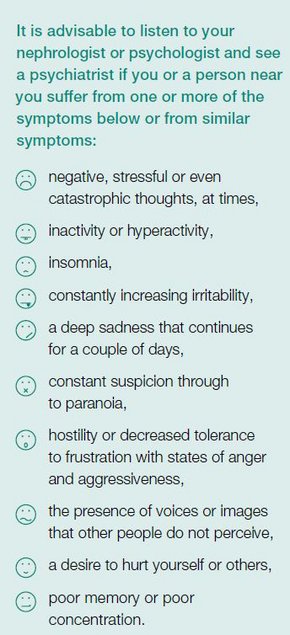For 25 years, R. A. has been a patient in the dialysis program of the Nefromed centre in Piatra Neamț, Romania. We want to begin this article with her story. “Five years ago, I fell and fractured my pelvis. I was terrified of being paralysed. My fears intensified to such extent that I was later diagnosed with panic attacks caused by posttraumatic stress. I experienced a variety of symptoms such as anxiety, fear of darkness, fear of loneliness, insomnia, palpitations, hypertension. I also avoided being around other people.
Without cause, I had sudden occurrences of profuse sweating. I had lost my appetite. The fear of going insane was growing, a fear that I felt I could not share with anyone. The state of panic was almost permanent, making it difficult to concentrate. My mind was constantly spinning. After the fracture had healed, I visited different medical practitioners. I went to see a cardiologist, a neurologist, an endocrinologist. I so wanted to get out of this state, I even talked with a priest. The clinic’s psychologist recommended that I see a psychiatrist, but that seemed too strange. A couple of days later, however, walking along a street, I noticed the sign of a psychiatrist’s cabinet. We shared the same first name. I took that as a sign and immediately decided to see a psychiatrist. What can I say? It proved to be the solution to my poor state.
A short while after starting the treatment advised by the psychiatrist, I began to sleep and eat again; I began to feel better and to see life with new eyes. I warmly recommend to anyone going through similar situations not to hesitate and talk to a psychiatrist. It may be difficult to open up at first but I firmly suggest this, because now I understand the importance of psychiatric treatment. Moreover, the psychiatric treatment may consist of just small things, which – like in my case – can make significant changes.”



![[Translate to COM English:] Older friends together](/fileadmin/_processed_/9/a/csm_building_your_support_team1_2a71bdb252.jpg)
![[Translate to COM English:] Happy family](/fileadmin/_processed_/8/e/csm_building_your_support_team2_7a48d69191.jpg)
![[Translate to COM English:] Older friends playing cards](/fileadmin/_processed_/e/3/csm_building_your_support_team3_79c7cb463e.jpg)
![[Translate to COM English:] Patient and social worker](/fileadmin/_processed_/c/a/csm_building_your_support_team4_76a889f88b.jpg)

![[Translate to COM English:] Elderly couple with their bicycles](/fileadmin/_processed_/2/7/csm_physical_exercise1_6cc7ea6f48.jpg)